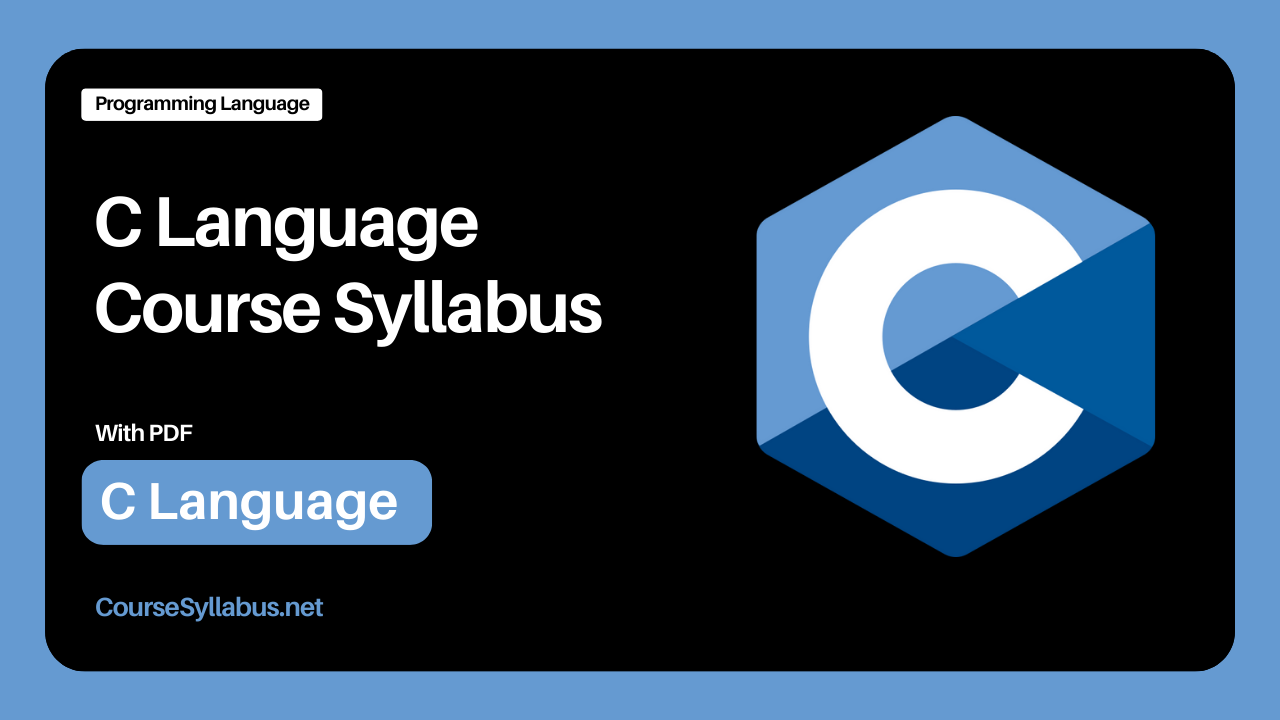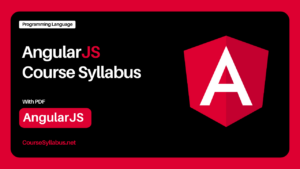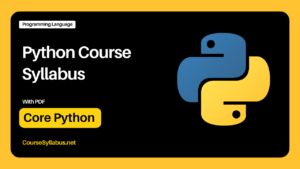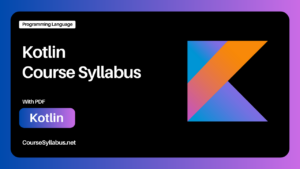C is a general-purpose, procedural programming language initially developed by Dennis Ritchie at Bell Labs in the early 1970s. It was designed to be a system programming language for the UNIX operating system. Over time, C has become one of the most widely used programming languages in the world. It is known for its efficiency, flexibility, and portability.
C Language Course Syllabus
Module 1: Introduction to C Programming
- Overview of C programming language
- History and evolution of C
- Basic structure of a C program
- Writing and executing a simple C program
- Data types, variables, and constants
- Input and output functions
- Basic arithmetic operations
Module 2: Control Structures
- Conditional statements (if, else if, else)
- Switch case statements
- Loops (while, do-while, for)
- Break and continue statements
- Logical and relational operators
- Using control structures to solve problems
Module 3: Functions and Modular Programming
- Introduction to functions
- Function declaration and definition
- Passing arguments to functions
- Return statement
- Scope rules and storage classes
- Recursion
- Header files and function prototypes
- Modular programming concepts
Module 4: Arrays and Strings
- Introduction to arrays
- Declaration and initialization of arrays
- Accessing array elements
- Array manipulation techniques
- Multi-dimensional arrays
- Introduction to strings
- String manipulation functions
- String input and output
Module 5: Pointers
- Introduction to pointers
- Pointer declaration and initialization
- Pointer arithmetic
- Passing pointers to functions
- Dynamic memory allocation (malloc, calloc, realloc, free)
- Pointers and arrays
- Pointers to functions
Module 6: Structures and Unions
- Introduction to structures
- Declaration and initialization of structures
- Accessing structure members
- Arrays of structures
- Passing structures to functions
- Introduction to unions
- Differences between structures and unions
Module 7: File Handling
- Introduction to file handling in C
- Opening and closing files
- Reading from and writing to files
- Sequential file access
- Random file access
- Error handling in file operations
- File manipulation functions
Module 8: Advanced Concepts
- Preprocessor directives
- Enumerations
- Typedef keyword
- Bitwise operators
- Advanced data structures (linked lists, stacks, queues)
- Introduction to function pointers
- Introduction to C libraries
Module 9: Debugging and Optimization
- Debugging techniques
- Using debugging tools (e.g., gdb)
- Identifying and fixing common programming errors
- Strategies for optimizing C code
- Performance analysis techniques
Module 10: Project Work
- Implementation of a small-scale project using C
- Project planning and management
- Documentation and presentation of the project
C Language Learning Resources
There are many resources available for learning the C programming language, ranging from online tutorials and courses to books and interactive platforms. Here are some popular options:
Time for Learning C Language
The time it takes to learn C depends on your background and goals:
- Beginner (no prior programming experience): Expect at least 3 months to grasp the fundamentals if you dedicate 1-2 hours daily to studying and practicing.
- Prior programming experience: If you’re familiar with other languages, you might learn the basics in 1-2 months.
- Experienced programmer: With a strong programming foundation, you could pick up C in a few weeks.
Here’s the key: There’s a difference between learning the syntax (the rules of the language) and truly becoming proficient. To truly master C, it takes consistent practice over years, applying your knowledge to solve problems and build projects.
Career Opportunities with C Language
C, despite being older than some programmers, offers a surprising range of career opportunities due to its versatility and efficiency. Here are some exciting paths you can consider:
- Systems Programming: C is fundamental for low-level programming, making it crucial for systems programmers who build operating systems, device drivers, and firmware.
- Embedded Systems Engineer: The brains behind everyday devices from smartphones to smartwatches often rely on C for their efficient resource management.
- Kernel Developer: If contributing to the core of operating systems like Linux interests you, understanding C is essential.
- IoT Developer: The Internet of Things (IoT) demands resource-conscious programming, and C fits the bill perfectly for developing firmware and applications for these devices.
- Robotics Engineer: Robotics requires expertise in both hardware and software. C’s efficiency makes it valuable for developing control software for robots and embedded systems.
- Game Programmer: While higher-level languages dominate modern game development, C can still be found in performance-critical areas of game engines or graphics programming.
- Security Analyst: Understanding C can be advantageous for security analysts who may need to analyze low-level code or exploit vulnerabilities.
- Machine Learning Engineer: While not the primary language for machine learning, C can be used for optimizing algorithms or developing high-performance computing applications in this field.
Remember, these are just some examples. C’s foundational nature opens doors to various software development and engineering roles where efficiency and control over hardware are priorities.
Here are some additional tips for exploring C career opportunities:
- Build a portfolio: Showcase your C skills by creating personal projects.
- Contribute to open-source projects: This demonstrates your passion and gives you valuable real-world experience.
- Network with C developers: Connect with professionals on platforms like LinkedIn to learn about their experiences.
With dedication and a strong understanding of C, you can unlock a fulfilling career path!
Conclusion:
By investing time and effort in learning C programming and gaining practical experience through projects and contributions to open-source software, you can position yourself for success in the dynamic and ever-evolving field of technology.




